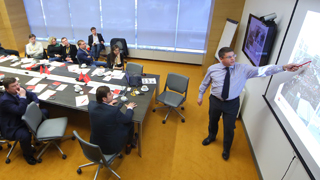
Socialinis dialogas
Socialinį dialogą galima apibrėžti kaip darbdavių ir darbuotojų derybas, konsultacijas, bendrus veiksmus, diskusijas ir dalijimąsi informaciją. Sklandus socialinis dialogas yra svarbus būdas formuoti darbo sąlygas, į šį procesą įvairiais lygmenimis įtraukiant įvairius subjektus. Toks dialogas padeda derinti darbuotojų ir darbdavių interesus, taip pat užtikrinti tiek ekonominį konkurencingumą, tiek socialinę sanglaudą.
Sprendžiant iš pastarųjų ES lygmens politikos diskusijų (ypač po 2008 m. krizės), nauji svarstymai apie socialinį teisingumą, demokratiją, darbo kokybę ir naujus darbo santykių modelius paskatino abejones dėl tradicinių darbo santykių ir socialinio dialogo sistemų.
Praėjus trisdešimčiai metų po to, kai Val Duchesse pilyje Briuselyje buvo istoriškai pradėtas Europos socialinis dialogas, Komisija atnaujino procesą ir paskelbė apie socialinio dialogo atnaujinimą 2015 m. kovo 5 d. surengtame aukšto lygmens renginyje, kuriame dalyvavo visos Europos socialinių partnerių organizacijų atstovai. Europos socialinis dialogas yra ES socialinės politikos priemonė, tiesiogiai padedanti formuoti ES darbo teisės aktus ir politiką.
- Europos Komisijos renginys „Nauja socialinio dialogo pradžia“
- Eurofound tinklaraščio straipsnis „From Val Duchesse to Riga: how to relaunch social dialogue?“ („Nuo Val Duchesse pilies iki Rygos. Kaip atnaujinti socialinį dialogą?“)

























